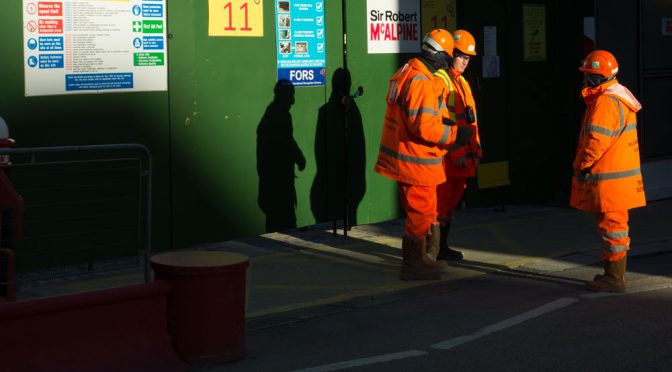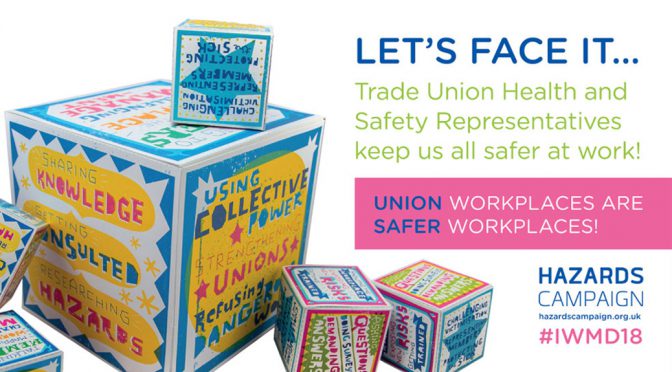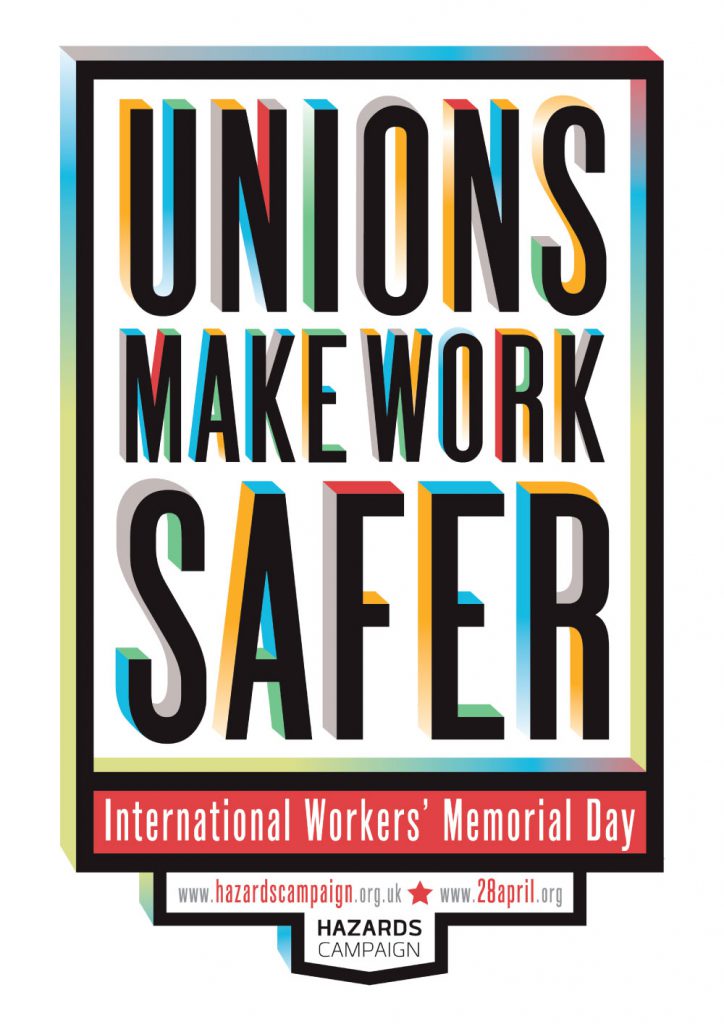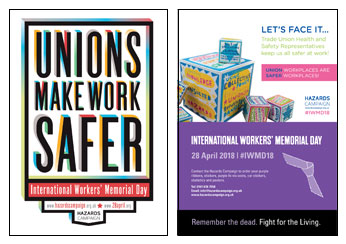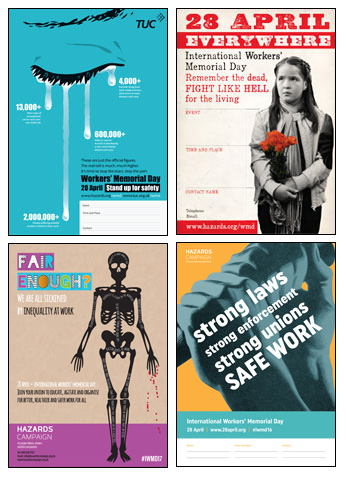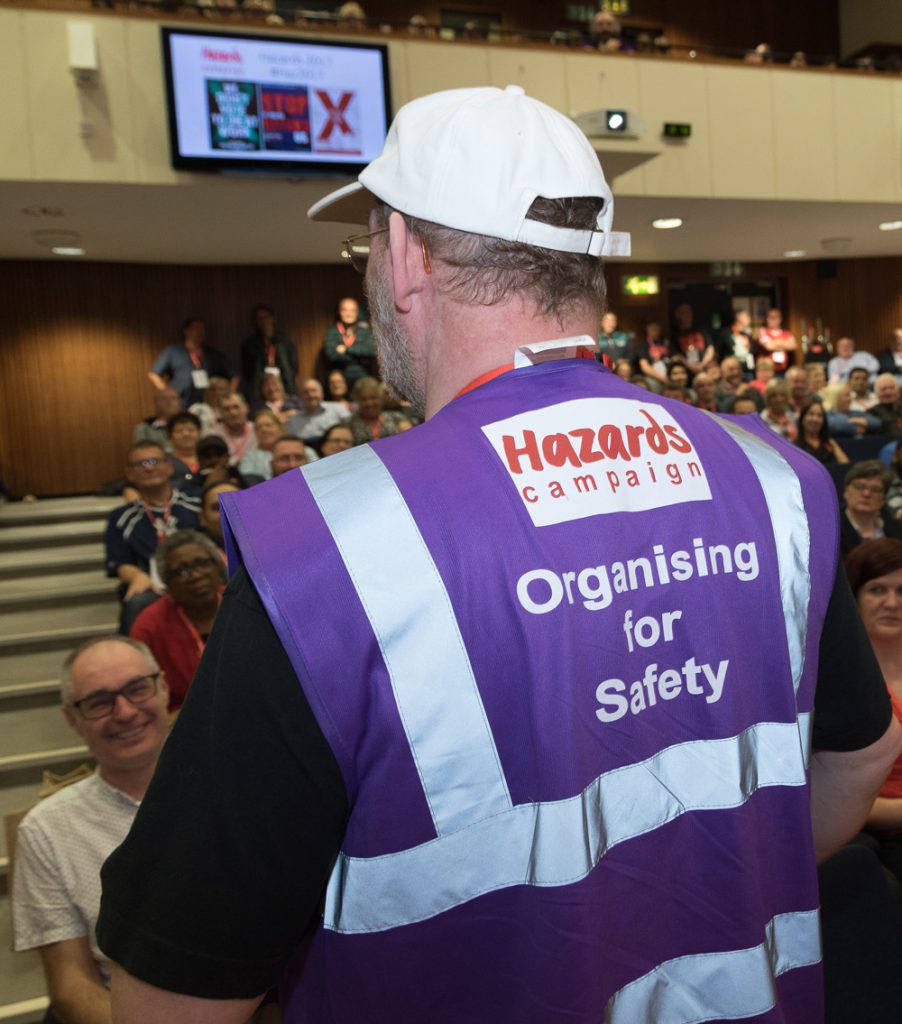28 April International Workers Memorial Day #IWMD18
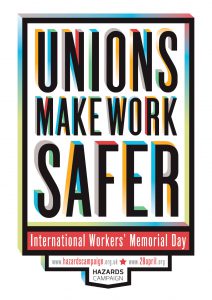 Remember the Dead Fight for the Living – Fighting for our lives in Unions
Remember the Dead Fight for the Living – Fighting for our lives in Unions
A large body of evidence shows that Unionised Workplaces are Safer Workplaces .
Through workers organising together in unions they can fight for safer, healthier and decent work for all. Collective action and elected safety reps create the proven ‘Union Safety Effect’ making workplaces twice as safe.1 In 2018 we are celebrating 40 years of the Safety Representatives and Safety Committee Regulations, SRSCR, which give elected union safety reps the powers and functions to hold employers to account, challenge them and work with them to make work safe and healthier.
Under the SRSCR, Safety Reps have the right to as much paid time to do their job as necessary – not facility time. Their role includes carrying out inspections and surveys; talking to members, mapping the workplace; investigating incidents; making reports, and representations to management; being consulted in good time about anything that affects health and safety-chemicals, stress, jobs design, work changes, pay, shifts, staffing levels -to be involved in risk assessments, represent members and act collectively to make the workplaces better for all workers. It works:
Safety reps save lives, save health and save money. Unions make workplaces twice as safe as non organised workplaces
Hazards Campaigner Tommy Harte brought International Workers’ Memorial Day (IWMD) to the UK in the 1990s from Canada and USA, with two aims: to “Remember the Dead” and to “Fight for the Living. The Hazards Campaign promotes and resources IWMD which is now commemorated in hundreds of events across the UK from Aberdeen to Penzance. We focus on both aims by holding events or memorials to remember all those killed through work and at the same time to campaign against the causes of these preventable tragedies to stop workers being killed in future. International Workers Memorial Day, IWMD, is now commemorated throughout the world, in thousands of events involving millions of people and is recognised by dozens of countries including the UK Government in 2009. The #IWMD18 theme agreed by ITUC and Trade Unions internationally is:
Unionised Workplaces are Safer Workplaces No-one should ever die just for going to work . Millions do every year, not in freak accidents or of rare illnesses, but because employers did not comply with the law, and governments let them get away with it Almost ALL workplace death, injury and illness is PREVENTABLE
In GB, Health and Safety Executive, HSE, annual figures of 137 deaths at work in 2016/17 only covers those reported to HSE and Local Authorities. It excludes members of the public killed in work incidents, workers killed on roads, at sea, in air and by work-suicide. The figure also excludes those dying because of bad work conditions from cancers, heart, lung and other diseases. Using expert research, the Hazards Campaign estimates a more realistic figure for those killed in work-related incidents is 1,477 and those dying of work illnesses as 50,000 per year.
That is around 140 people dying from work per day or one person every 10 minutes in GB.
The UN ILO estimates 2.78 million people worldwide dying from work every year up from 2.3 million in 2014. One person killed by work every 11 seconds worldwide.
Safety Reps saving lives at work for 40 years! This year we celebrate the birth of the TUC, established at the Mechanics Institute at a meeting called by Salford and Manchester Trades Union Councils 150 years ago, as well as the 40th anniversary of the Safety Representatives and Safety C/te Regulations, one of the most important laws for workers’ lives and health but one that has been almost totally unenforced.
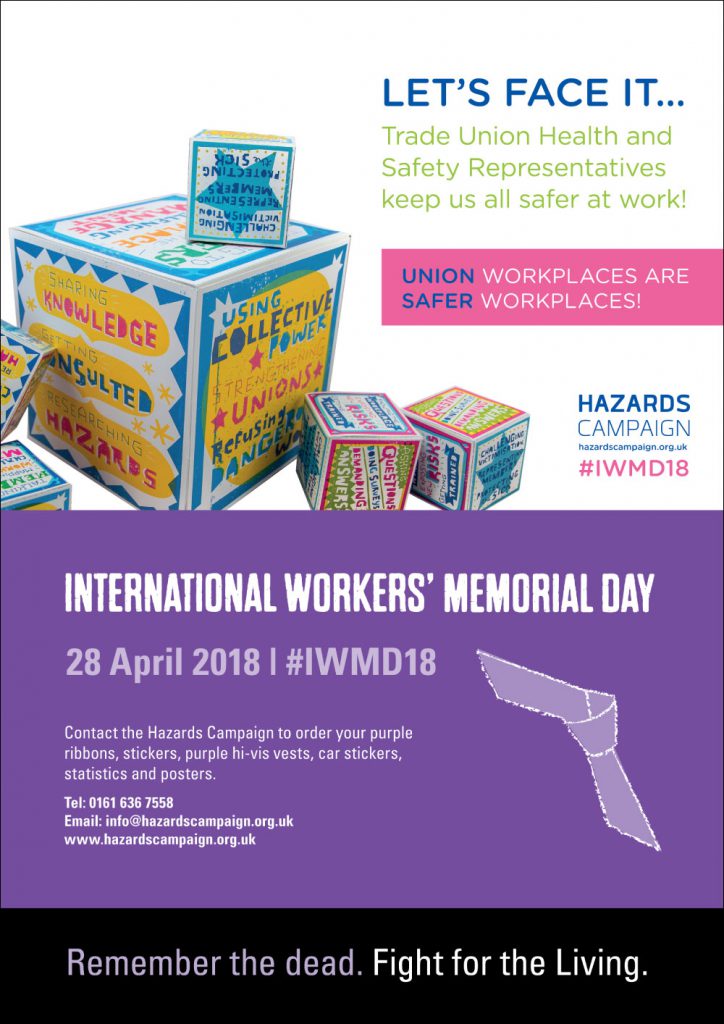
Workers began organising in Trade Unions 150—200 years ago, to improve health and safety in their own workplaces and through political action to win wider legal changes and protections. By educating agitating and organising and acting collectively, unions gained a shorter working day, more time off work, reduction in exposure to chemicals, dangerous machinery, an end to child labour and exploitation, and won stronger social protection laws and stricter enforcement, as well as fighting for higher wages.
It’s not about asking for improvements but having the collective voice and industrial power to demand them.
Union action also led to the Health and Safety at Work Act in 1974 and the Safety Representatives and Safety C/te Regulations in 1977 which enabled unions and safety reps to be even more effective in cutting the death rate in work incidents and making a major impact on work-related illnesses. Everyone should come home safe and well after their shift. But we still have too many workplaces that kill, injure and make workers very sick, often to death . Injuries and death at work may have fallen but problems including work cancers, insecurity and the despair of work stress related to low pay, insecurity, overwork and a lack of respect are rocketing and “only informed collective action will really make work better” 5
The TUC has collected Safety Rep success stories 6 which add to the massive body of evidence shows that union organisation and safety reps do make work safer, save lives, save health, and save money for employers and the economy—up to £700 million per year proving that good health and safety is not a burden on business, or a job killer but a positive contribution to our human rights. Poor health and safety costs, on Hazards estimates, between £30 and 60 billion per year.
Sharan Burrow ITUC: “Health is a human right and does not stop at the factory gates. Our strategy will use all the trade union instruments – namely, representation, negotiation and action – for the organization for decent, safe and healthy work”
Despite all of this evidence, since 2010 government has attacked health and safety law and enforcement as ‘red tape’, employers ride rough shod over laws and fail to comply, and the Trade Union Act makes it harder for unions to protect and defend workers health. A big cut in funding enforcement led to far fewer preventative inspections and enforcement actions on non-compliant, criminal employers, so increasingly it is down to Safety Reps!
Hugh Robertson, TUC says ” It is clear that we need trade unions more than ever before. The case has been proven that safety reps are good for workers, good for the economy and good for business….The only people who fear us are employers who want to cut corners and take risks with our lives. Good employers are already working with unions, we need the rest to start recognising the benefits and we need the government to stop attacking unions and instead do more to ensure that employers are consulting with union so that everyone can get the benefits unions bring”
Use #IWMD to fight for our lives and join together in unions to make work safer !
Hazards Campaign c/o GMHC. Windrush Millennium Centre, 70 Alexandre Road, Manchester, M16 7WD info@hazardscampaign.org.uk @hazardscampaign
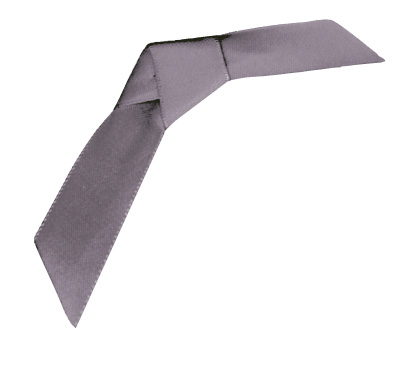
UNION Workplaces are Safer & Healthier #IWMD18 Wear a purple forget-me-knot ribbon Put a sticker in your car TAKE ACTION on 28 April #IWMD18
In GB there are around 1,500 deaths from incidents and 50,000 from work illnesses, over 621,000 injuries and millions made ill by work every year. Almost all work deaths, injuries and illness are due to employers’ mismanagement. Inequality and discrimination at work mean that the most vulnerable workers—the poorest, women, young, ethnic minority, migrant, LBGT and non unionised workers— are at more risk of being made ill, injured or killed by work.

What you can do on #iwmd18 Big Up Unions! Use the Resources to shout loud and proud that UNIONS MAKE WORK SAFER and take action to strengthen your union organisation or create a union at work.
- Find out what is happening in your area on 28 April, see TUC list of events email details or your event to healthandsafety@tuc.org.uk & own union
- If nothing is happening then get together with workmates and organise – a commemorative rally, a minutes silence; a workplace inspection, a meeting to discuss health and safety and celebrate the positive impact of unions and Safety Reps @40 , use the Safety Rep Box to discuss what you can do
- Ask your local council, or any other public body, to fly official flags at half-mast on the day. Remember that the day is officially recognised by the UK government;
- Arrange an event such as planting a memorial tree in a public place, putting up a plaque, dedicating a sculpture, a piece of art, or a bench, to remember workers who have been killed at the workplace or in the community;
- Workers’ Memorial Day is on 28 April, consider how you can best use local media both before & on the day.
- If you are planning any event for the day, or you want to raise awareness: distribute and wear purple ‘forget-me-not’ ribbons, put up posters, and remember to let people know about anything that happens in your area on the day. Order resources: http://www.hazardscampaign.org.uk/wp-content/uploads/2018/02/iwmd18resources.pdf
- Send ecard to Prime Minister demanding end to attacks on laws that protect our lives & health because as Grenfell fire & all work deaths show: ‘Red Tape is better than bloody bandages’:
- Tweet about your workplace union health and safety successes use internationally unifying hashtag #IWMD18 and check it for new resources and retweet.
#IWMD18 Resources and Information
Purple Ribbons the symbol of the day; Union Workplaces are Safer Workplaces Car Stickers, High Vis jackets & FREE posters
Hazards Magazine Articles on Safety Reps@40: ‘It’s down to you’ ‘What’s your best face’ Safety Reps Rights Box
TUC Safety Reps@40
https://www.ituc-csi.org/IMG/pdf/28_april_2018_en.pdf
Sharan Burrows ITUC: Unions are organising for safer, healthier, decent work @SharanBurrow. @ITUC
TUC list of events
GMHC IWMD Background Leaflet:
The Whole Story: Our estimates of the real toll of deaths and illnesses caused by work which are far greater than HSE publishes or press/media report
FILMS
Louise Taggart’s blog about her brother Michael who went to work & was killed by employer’s negligence-
Carol Harte’s film of Tommy Harte bringing IWMD to the UK
GMHC International Workers’ Memorial Day
UNITE The Safety of the Vulnerable Worker
UNISON Problems in the Care Sector
Thompson’s Solicitors: Industrial injury, compensation, the Government and the Law
ASLEF Rail Safety
BFAWU Fighting for justice
#IWMD2014: Deregulatory Daleks tied up in red tape! Hazards Magazine:
Families Against Corporate Killers, FACK work with families of those killed by work: BellyflopTV
See also Facebook: Families Against Corporate Killers
FACKers tell their stories: ‘Face the FACKs: the Human Face of Corporate Killing’
Face the FACKs Part 1 Face the FACKs Part 2
Face the FACKs Part 3 Face the FACKs Part 4
TV coverage Cameron Minshull Cameron Killed
Hazards Campaign c/o GMHC, Windrush Millennium Centre, 70 Alexandre Road, Manchester, M16 7WD info@hazardscampaign.org.uk @hazardscampaign
Face Book: We Didn’t Vote to Die at Work
